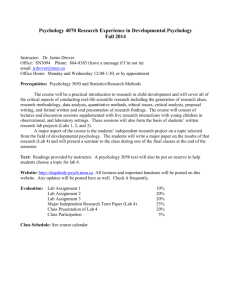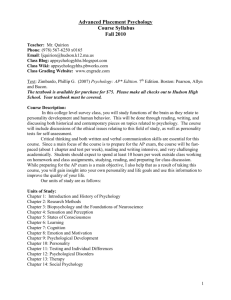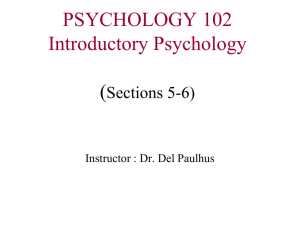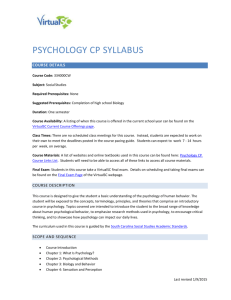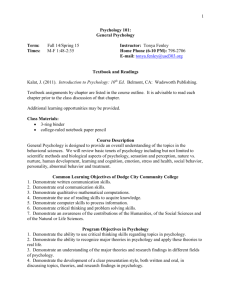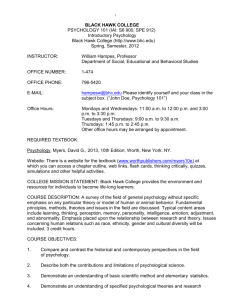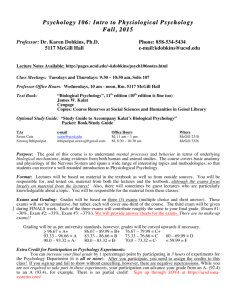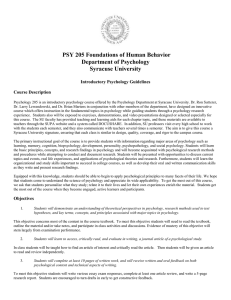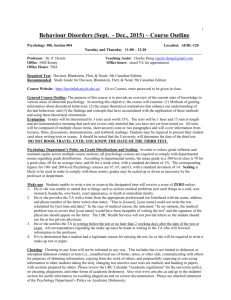Social Psychology - Plattsburgh State Faculty and Research Web Sites
advertisement
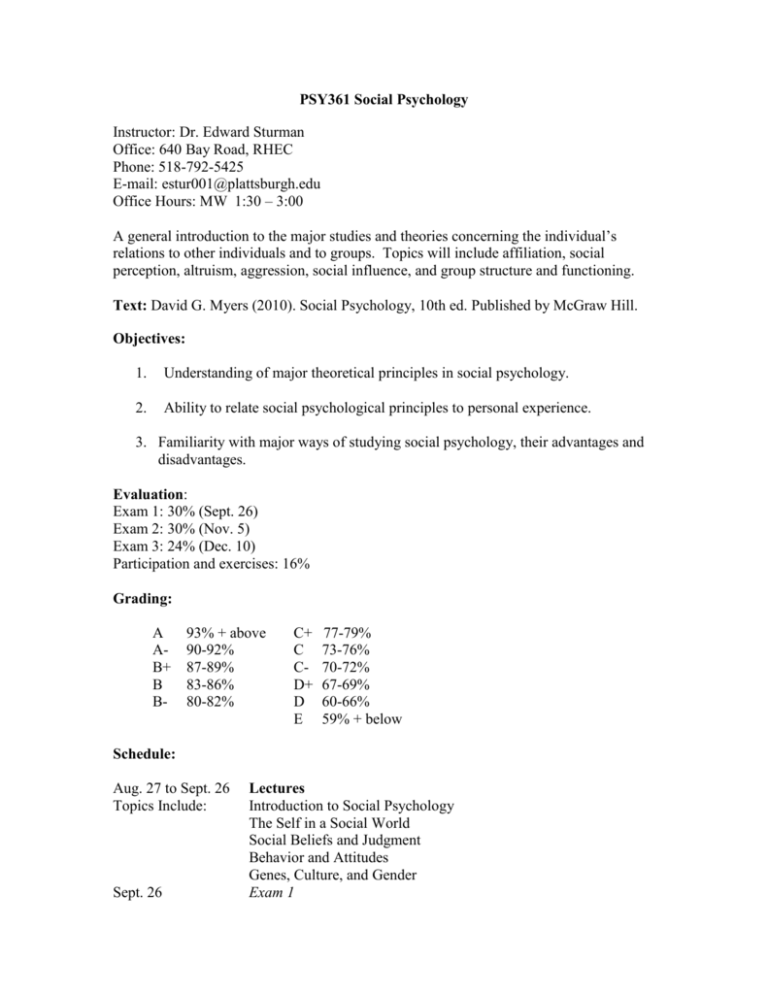
PSY361 Social Psychology Instructor: Dr. Edward Sturman Office: 640 Bay Road, RHEC Phone: 518-792-5425 E-mail: estur001@plattsburgh.edu Office Hours: MW 1:30 – 3:00 A general introduction to the major studies and theories concerning the individual’s relations to other individuals and to groups. Topics will include affiliation, social perception, altruism, aggression, social influence, and group structure and functioning. Text: David G. Myers (2010). Social Psychology, 10th ed. Published by McGraw Hill. Objectives: 1. Understanding of major theoretical principles in social psychology. 2. Ability to relate social psychological principles to personal experience. 3. Familiarity with major ways of studying social psychology, their advantages and disadvantages. Evaluation: Exam 1: 30% (Sept. 26) Exam 2: 30% (Nov. 5) Exam 3: 24% (Dec. 10) Participation and exercises: 16% Grading: A AB+ B B- 93% + above 90-92% 87-89% 83-86% 80-82% C+ C CD+ D E 77-79% 73-76% 70-72% 67-69% 60-66% 59% + below Schedule: Aug. 27 to Sept. 26 Topics Include: Sept. 26 Lectures Introduction to Social Psychology The Self in a Social World Social Beliefs and Judgment Behavior and Attitudes Genes, Culture, and Gender Exam 1 Oct. 1 – Nov. 5 Topics Include: Nov. 5 Nov. 7 – Dec. 5 Topics Include: Dec. 10 Lectures Conformity and Obedience Persuasion Group Influence Prejudice Aggression Exam 2 Lectures Attraction and Intimacy Helping Conflict and Peacemaking Dehumanization Social Psychology in Court Exam 3 Exams: All exams will be based on the lectures and readings. They will consist of multiple choice questions and 4-6 short answer questions. Participation: Participation will be based on a combination of attendance, group discussion, and the completion of exercises and activities. Students are expected to attend all classes. Group discussions will be held periodically and students will be asked to work together to answer questions related to the material covered in lecture. Exercises and activities related to the lessons will also be available to students and promise to be fun and informative. Films: The course will offer several films related to the material at hand. Fortunately, the topic areas covered by Social Psychology have spawned a number of informative and entertaining films. Missed Tests or Late Assignments: Students may request that tests be rescheduled or deadlines extended for legitimate medical or compassionate reasons as well as religious observances. In all cases, these occurrences should be accompanied by appropriate documentation. If, for any of the above reasons, students are not able to fulfill their obligations according to schedule, they should notify the instructor in advance, or by the due date, so that the necessary accommodations can be arranged. Policy on Plagiarism/Academic Dishonesty: Cheating is the willful misrepresentation of any part or all of another’s work as one’s own. Copying another’s answers, or giving or receiving unpermitted aid during classroom or take-home examinations, assignments, papers, research reports and projects is cheating. Plagiarism in all of its forms is cheating. Please refer to the campus academic policy at: http://www.plattsburgh.edu/offices/academic/provost/academichonesty.php. Possible penalties for students found to be cheating on tests or assignments include failure on the test, assignment or course. In regards to plagiarism, you may not represent another person’s words or ideas as your own. When using the words of other authors, you must place quotation marks around the text you have borrowed. Similarly, when discussing the ideas of other authors, you must acknowledge the source. The APA Publication Manual (5th edition) has specific guidelines for citing the works of others. If you are unsure as to whether you are plagiarizing another person’s work, please contact the course instructor for clarification. College Honor Code: It is expected that all students enrolled in this class support the letter and the spirit of the Academic Honesty Policy as stated in the college catalog.


